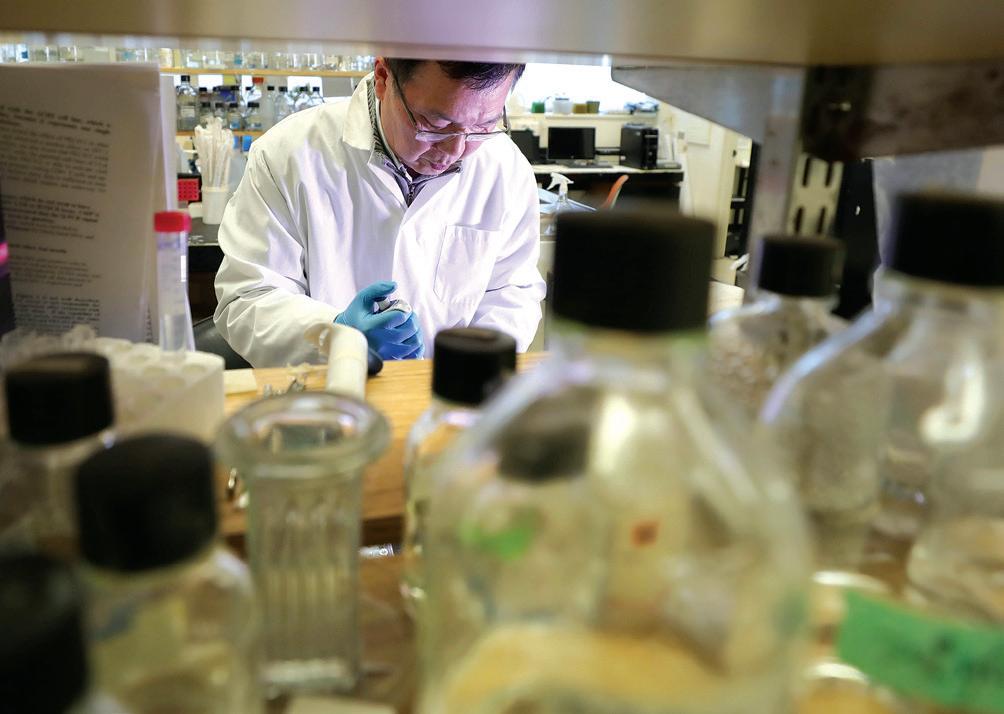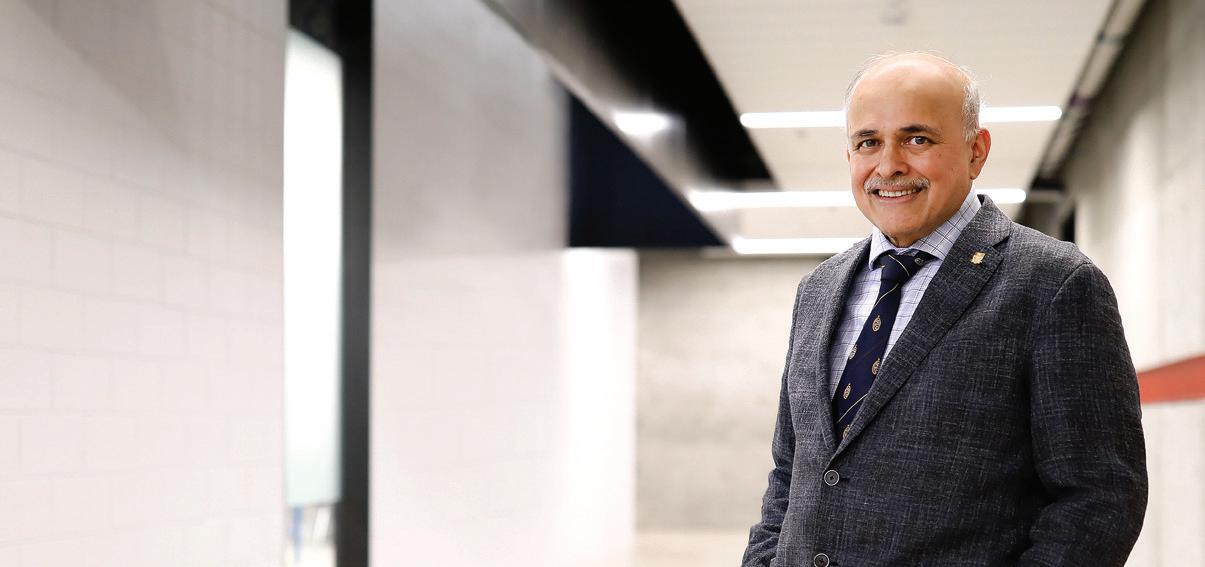
4 minute read
Happenings & Kudos
Leveraging Canada’s Expertise
UM research teams are seeking to accelerate the development, testing and implementation of measures to mitigate the spread of COVID-19 and its negative impacts on people, communities and health systems. With funding from the Social Sciences and Humanities Research Council, Natural Sciences and Engineering Research Council, Canadian Institutes of Health Research, the Canada Foundation for Innovation, Research Manitoba and others, UM teams are tackling a variety of issues and impacts, including:
Advertisement
Research, scholarly work and creative activities underway related to the ongoing COVID-19 pandemic made up of as many investigations as there are impacts on our society. Despite the stoppage of on campus/in person research activities in March 2020, work continued remotely, with a phased resumption of those activities deemed essential as the pandemic allowed. UM prioritizes research related to all aspects of COVID-19 as essential.
FUNDERS: 33
PROJECT TEAMS: 73
FUNDING: $16 MILLION +
REGIONS: CANADA,U.S., BRAZIL, MEXICO, AUSTRALIA, CHINA, UNITED KINGDOM
RESEARCH LEADS: 61
COLLABORATIONS: 82+
VACCINE DEVELOPMENT
Xiao-Jian Yao (medical microbiology and infectious diseases) is leading a team developing two COVID-19 vaccine candidates. One approach involves generating virus-like particle vaccine coated with both COVID-19 spike protein and a dendritic cell-targetting RBD domain of COVID-19 from an FDA-approved cell-line. The second approach uses a viral vector called the vesicular stomatitis virus (VSV) and placing a dendritic cell-targetting RBD domain of COVID-19 into the VSV vector.

OLDER ADULTS
Verena Menec (community health sciences) is leading the Manitoba platform of the Canadian Longitudinal Study on Aging COVID-19 Seroprevalence Study. Findings will provide a comprehensive picture of the prevalence and impact of the virus among older adults in Canada. Menec is former Canada Research Chair (CRC) in Healthy Aging.
CANADIAN POPULATIONS
Michelle Driedger (community health sciences) is examining public health COVID-19 outbreak management strategies. Her research focus is on how members of the general public, including special targeted populations like the Métis, understand public health communication efforts about how they can protect themselves and their families. Driedger is former CRC in Environment and Health Risk Communications.
YOUNG WORKERS
Roberta Woodgate (nursing) is partnering with NorWest Co-Op Community Health Inc. and its integrated youth service centre, NorWest Youth Hub, to detail the employment needs and challenges of young people in the COVID-19 era with the intent to identify solutions that will result in more supportive, responsive, safe and healthy workplaces. Woodgate holds a CRC in Child and Family Engagement in Health Research and Healthcare.
Transforming Power Transmission for a secure carbon free future

Distinguished Professor Aniruddha Gole
2019 Dr. John M. Bowman Memorial Winnipeg Rh Institute Foundation Award recipient
THE ELECTRICAL NETWORK OF TODAY IS UNDERGOING A great transformation. Gone are the days when electricity was generated close to population centres and essentially serviced only local loads. Today’s networks are continentwide and there is even talk of interconnecting multiple continents. Such an arrangement allows harnessing renewable energy sources such as wind, solar or hydroelectric energy and transporting it to distant populated destinations.
This is something that Distinguished Professor Aniruddha Gole [MSc/80, PhD/82], PEng has spent decades studying and developing innovations that allow society to enjoy the benefits of electrical energy. His research encompasses various aspects of DC transmission, power system simulation and power electronic applications. Products he has developed with collaborators are used in over 80 per cent of the world’s high voltage DC systems.
In recognition of his decades of outstanding research accomplishments Gole was awarded the 2019 Dr. John M. Bowman Winnipeg Rh Institute Foundation Award. Gole holds an NSERC Industrial Research Chair in Power Systems Simulation in the Price Faculty of Engineering.
Gole advises that the very complexity and size of the modern power grid makes its design and operation a great challenge. Experimentation is generally not possible the way it is for other industrial products. For this reason, the behavior of such networks is usually investigated using computer-based simulation tools.
For context, the Manitoba engineering community is a world leader in simulator development. Two of the world’s leading manufacturers are based in Winnipeg. PSCAD™/EMTDC™ which, with a base of over 35,000 users internationally, is now the world’s most widely used electromagnetic simulation program for power systems. It was originally developed by Dennis Woodford at Manitoba Hydro working with Gole and his graduate student Garth Irwin.
“The great increase in computing power means that real-time (RT) simulation is a reality,” says Gole. “It can produce results as fast as in the real world, thereby permitting the testing of control hardware via connecting to a simulator instead of to the real system.”
A team of researchers from the Manitoba HVDC research Centre and Goles’ graduate students Dr. Trevor Maguire and Rudi Wierckx developed the world’s first and the most widely used real-time simulator—the RTDS—which is now commercialized by RTDS Technologies of Winnipeg, located at UM’s Smartpark. In the last two decades, PSCAD™and RTDS have been used for the design of the majority of the world’s high voltage DC transmission systems.
Research at the University of Manitoba has been and continues to be an indispensable component in maintaining the cutting edge of power simulator research.
The Rh Awards are awarded by the Winnipeg Rh Institute Foundation to support the advancement of knowledge in all fields at UM. The Dr. John M. Bowman Memorial Winnipeg Rh Institute Foundation Award, established in 1997 and renamed in Dr. Bowman’s memory in 2005, recognizes outstanding research accomplishments by a non-retired, established UM faculty member.


